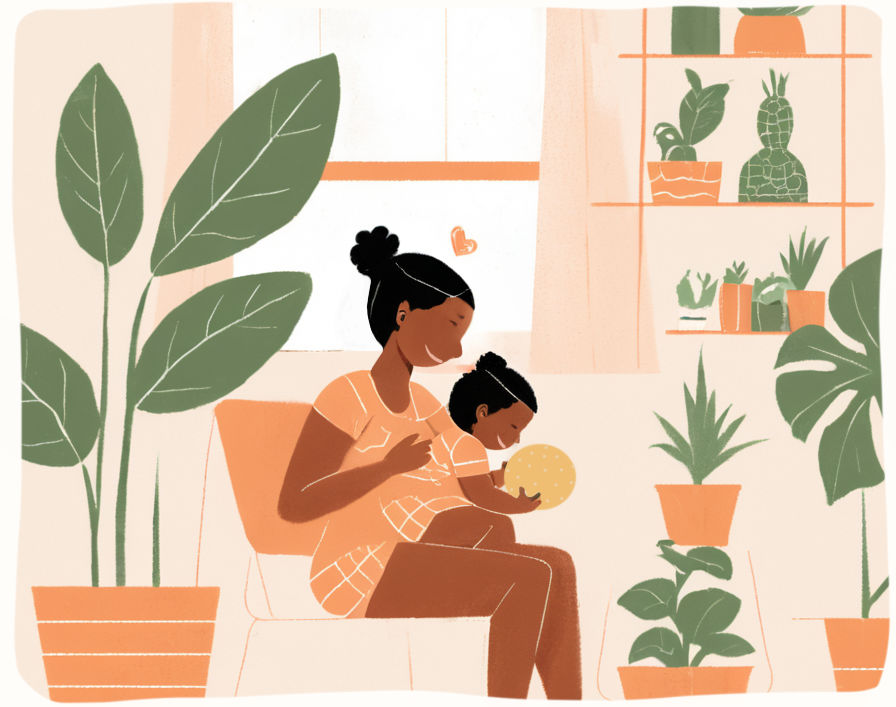Think holding your baby will spoil them? Worried they’re not walking by one year? Here are 5 common baby development myths, and what science really says.

If you’re a new parent, you’ve probably heard it all: “Don’t spoil your baby by holding them too much.” Or, “They should be walking by their first birthday.” Maybe even, “Talking late means something’s wrong.” Sound familiar?
Parenting advice is everywhere, from family, friends, strangers in the grocery store, even social media. And while most people mean well, some of these “tips” are outdated or just plain wrong. The good news? Science paints a much more reassuring picture.
Here are five common myths about baby development, and what’s really going on behind the scenes.
Many parents worry that responding quickly to every cry will make their baby clingy or “spoiled.”
Babies can’t manipulate or “spoil” at this age. Crying is their only way to communicate. When you respond to them, you’re teaching them the world is safe and that their needs matter. This builds secure attachment, which is linked to better emotional health later in life.
Pick them up. Cuddle them. Comfort them. You’re not spoiling them: you’re building trust.
People love milestones, and first steps by the first birthday is a common expectation.
While some babies do walk at 12 months, many perfectly healthy babies start closer to 15 or even 18 months. Developmental timelines vary widely, and late walking rarely signals a problem on its own.
Focus less on the exact month and more on steady progress: pulling up, cruising along furniture, standing with support. Those are great signs that walking is coming soon.
Parents panic if their baby isn’t saying words as early as others.
Speech develops in stages. Many babies understand much more than they say. Some are quiet observers and suddenly burst into sentences later. Language delays can happen, but one late talker doesn’t automatically mean a disorder.
Keep talking to them, name what they see, respond to their babbles. If you’re worried, a pediatrician or speech therapist can reassure you, but don’t assume the worst.
Fast physical milestones are often seen as a sign of higher intelligence.
Walking early doesn’t predict future academic skills, and walking later doesn’t hold kids back. Development is not a competition. Each baby has their own strengths and pace.
Celebrate your baby’s progress without comparing them to others, especially babies you see online.
More toys, more music, more flashcards = faster learning, right?
Babies learn best in calm, loving environments where they feel safe to explore. Overstimulation (too much noise, too many lights) can actually stress them out and slow learning.
Provide gentle opportunities to explore: tummy time, peekaboo, singing, and balance them with quiet cuddle time. Quality, not quantity, matters most.
Parenting in the age of information overload is hard. It’s easy to second-guess every choice when you’re bombarded with advice. But here’s what research (and experience) shows: babies are resilient, capable, and wired to learn at their own pace.
Your job isn’t to speed them up. It’s to be there, to respond, to guide, to cheer them on. And that’s more than enough.
- Ann E Bigelow, Lela Rankin Williams. Infant Behav Dev. To have and to hold: Effects of physical contact on infants and their caregivers. 2020 Sep 20; 61:101494. url: https://pmc.ncbi.nlm.nih.gov/articles/PMC7502223/
- Sachine Yoshida, Hiromasa Funato. iScience. Physical contact in parent-infant relationship and its effect on fostering a feeling of safety. 2021 Jun 12;24(7):102721. url: https://pmc.ncbi.nlm.nih.gov/articles/PMC8250458/
- Marc H. Bornstein, Diane L. Putnick, Paola Rigo, Gianluca Esposito, James E. Swain, Joan T. D. Suwalsky, Xueyun Su, Xiaoxia Du, Kaihua Zhang, Linda R. Cote, Nicola De Pisapia, and Paola Venuti. Neurobiology of culturally common maternal responses to infant cry. 2017;114(45):E9465-E9473. doi:10.1073/pnas.1712022114
- Gunfrid V Størvold, K Aarethun, Grete H Bratberg. Early Hum Dev. Age for onset of walking and prewalking strategies. 2013 Sep;89(9):655-9. url: https://pubmed.ncbi.nlm.nih.gov/23701748/
- Christina M Hospodar, Justine E Hoch, Do Kyeong Lee, Patrick E Shrout, Karen E Adolph. Dev Psychobiol. Practice and Proficiency: Factors that Facilitate Infant Walking Skill. 2021 Nov;63(7):e22187. url: https://pmc.ncbi.nlm.nih.gov/articles/PMC8550266/

